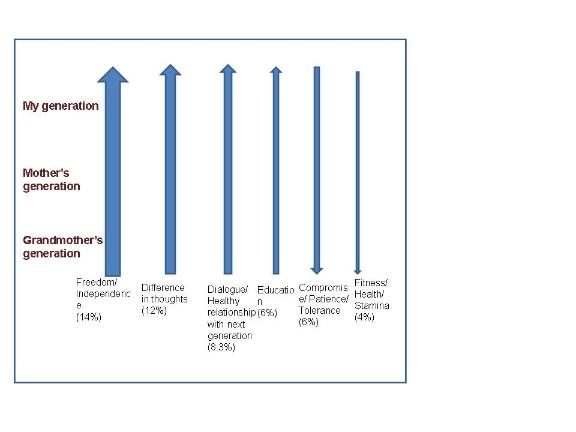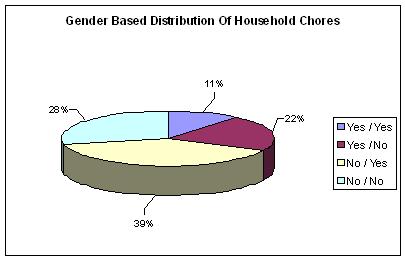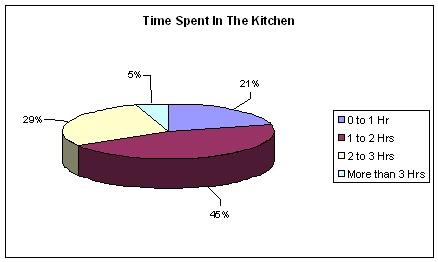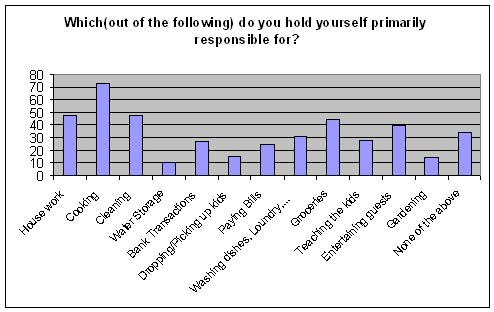Family
Except for the last, all other questions in this section were mandatory. The questions were based on the topics such as : gender-based division of the household chores, the traditional household responsibilities, the time dedicated to the kitchen related work and finally, the difference of opinions among three generations in a family regarding these issues.
Before you begin reading any further, we request you to please read the Primary Information section.
- In your family, do you have a gender based division of household chores? Do you believe in having such a division?
The options were as follows:
- Yes, we do have the division / it is the right way.
- Yes, we do have the division / it should not exist.
- No, we do not have such a division / but there should be one.
- No, we do not have such a division / this is how it should be.
The purpose of this question was to get some feedback about the gender based division of the household chores . From some of the answers that we have received, there is a room to infer that the given options were interpreted in an inaccurate way. (The answers given by the same person, to the rest of the questions in this section somehow do not justify the information provided here.)While answering the later part of the question, ‘Do you believe having such a division?’, some women have explained about the systems followed in their families, where as others have given a general opinion about ‘How the ideal scenario should be.’ Only the information about the scenario in their own families was expected.
33% of the women have told about having a gender-specific division of chores in their households.
- The time spent in the kitchen every day :
The number of women who spend less than one hour in the kitchen is 26 (21%), and none of them is a home-maker . The Indian residents spending less than an hour are either employed full time or have their own businesses, whereas the ones staying outside of India are employed either full time, part time, searching for a job or are students. The women who are currently the home-makers (61%) spend more than 2 hours in the kitchens every day.
-
Do you take care of the household work all by yourself? Who do you hold responsible for if some of the jobs are unfinished? For which of the following household tasks do you hold yourself solely responsible?
The number of women holding themselves responsible for the unfinished house-hold work (out of the list) is a lot less than expected. (Only 2) These 2 women have talked about hiring help to get the unfinished job done, even though they both feel that finishing these jobs is primarily their responsibility. Similarly, the number of women who feel that ‘out of the entire list, hardly a job or two is their responsibility’ is very less.(3), one of them is an unmarried student.
38 women feel that cooking and the rest of the domestic work (traditionally considered to be a woman’s job) is their responsibility . 30 women feel responsible for household work, cooking and cleaning . If you add washing dishes and doing laundry, 21 women felt responsible for these jobs as well. 34 women do not consider any of these jobs as their responsibility alone.
-
Do you have a hired help for the household work? How many and what type of jobs are outsourced?
57% of the women have no hired help. Most of these women reside outside of India. 9% of these women who are living abroad and still have the houses in India have a weekly, or monthly help to keep the houses clean and to tend the gardens. Of all the women living in India currently, 66% have a domestic help for some or the other house-hold work.
38 women have hired a maid to wash the dishes, 25 have hired the help for cleaning the floors, 23 have hired for the laundry, 13 women have a maid for making chapattis (a type of Indian bread), 12 women have maids for other house work, 6 women have nannies for their kids and 5 have cooks at home. Apart from this, some women also have a chauffer, someone to clean and wash the cars and additional help in the kitchen to chop the veggies etc. Though there is no mention of the total number of hired helping hands, it seems that most of them have at least one to two. The maximum number of domestic helpers has been mentioned as 5.
-
How satisfied are you with the amount of time that you get to spare for your kids or family?
Of all the women that have answered ‘not satisfied’, 50% live outside India and half of these women are of non-Indian origin . Most of the women answering negatively are full time employed. (Among the ones living outside India, 2 have mentioned to be students searching for a job.) 56% of these women have a gender-based division of household work and none of them have a hired help except one. Of the remaining 44%, most of the women handle mid-level managerial positions. These women were unsure about continuing the work after the responsibilities of the motherhood.
Among the women who claimed that they are well satisfied but would have liked to devote more time ; 36% have a gender-based division of household work. (Most of these women have full time jobs, but this category also includes home makers, students and the women working part time or having their own businesses. Most of the women claiming to be fully satisfied with the amount of time that they spend with their families are full time employed in mid or lower level management. Those who do not have a gender-based division of work at home, have hired help and devote satisfactory amount of time to the family handle mid or upper managerial jobs.
Among those that are completely satisfied with the time devoted to their families; 29% are employed full time.
-
What kind of differences do you find among the generations of your grandmother, mother, self and the kids?

This particular question has been answered very clearly, in depth and elaborately. In spite of the fact that this was an optional question with no word limit to answer, the replies are more organized, as compared to the rest of the questions in this section. Worth reading in their original form!
Each generation has their own perspective and way of thinking about the freedom of expression, education, decision making, financial matters, the compromises (putting the family first), family relationships, health, chores etc. Differences in these and many more aspects have been put forth by the women in this section. Especially, the difference in child raring has been answered very passionately.
Just to get an idea of the way women perceive the subject of health, we have pasted a few of the original responses here. These responses do highlight more or less a similar kind of view that the Indian women have regarding health The fact that various aspects of a woman’s health care such as an increased lifespan due to the birth control methods, infant mortality, availability of medical facilities to facilitate safer deliveries are not mentioned enough is worth thinking about. We refrain from commenting any further on these issues and leave it up to a reader to draw an inference.
To avoid making this survey analysis too lengthy, we have included just a few comments The original comments have not been altered and the words have been minimally processed. We encourage you to send us your opinions regarding the points discussed here.
‘Mother and grandmother had a lot more stamina in their younger days than us. On their own, they managed big families, matters of hospitality, as well as the religiously important days, festivals celebrations and rituals that were involved. They did not expect any help from their husbands to carry on with these jobs .Our generation, though equipped better with technical advancements and luxuries of machines to perform the similar tasks, lacks time to follow in their mothers’ footsteps. A woman of today is better capable of surviving and making an impression in the world outside of her home. Gender biases are diminishing in well educated families. The kids are becoming sharper and smarter.
Grandmother – The kitchen and being hospitable was her world.
Mother – Balanced home (including the kitchen), hospitality, her job and her hobbies.
Myself –Since I do not have a job, I lack the social experiences associated with it. I enjoy my hobbies very well. Unlike the previous generations of the females in the family, I do not enjoy the household work e.g. washing dishes and cleaning the house, but I have to do them any ways. I cannot put my heart and soul into these jobs like my ma and grandma did. I keep thinking about women’s emancipation and why should I be the only one ending up doing these chores... .. I become a rebel. Cannot be like my mother.
Mother’s generation was hard-working. Nowadays, I have become lazy. I am going through an identity crisis. The idea of being at home and having to take care of the house-hold jobs is somehow difficult to digest. I wonder how that well educated previous generation could manage to juggle everything!
A major difference of opinions, thoughts and an increasing degree of freedom of expression and that of behavior.
Looking at the three generations; mine, my mother’s and that of my grandmother’s; I feel that the only and a tiny difference lies in the extent of sacrifices made for the family. But when I observe the women in my husband’s family, I find a deeper chasm of differences These women never had a life of their own. It always revolved around the husband, the kids and the family. I feel that this difference is due to the environment that these women were raised in, rather than the generation.
The previous generation followed the customs and traditions without raising a doubt or a question. In spite of the changing mind set, they like to stick to ‘old is gold’. In contrast, the newer generation likes to try and test everything. It accepts only what feels right. My generation is in limbo, neither can it completely embrace the new nor fully reject the old.
Mother’s generation had stepped out of the house to earn money but did not focus on a ‘career’. They were more home-bodies. Therefore, it was a generation of ‘superwomen’ getting hammered on both the fronts, home and work. Grandmas’ generation focused fully on ‘home’ and our generation is privileged enough to choose either. That puts us in a better position, but the responsibility of making a choice can make one anxious.
Mother has absolutely no confidence. She had to face domestic violence. I have never endured injustice. I have courage, confidence and self respect. Due to a not so solid financial support, I had to face a scarcity of basic necessities of life including food, shelter and clothing. My son does not have to go through this. In fact, it would not be improper to say that he has way more than necessary.
There is definitely a difference of opinion. They feel that household work, kids, cooking etc is a woman’s responsibility. I beg to differ. According to them, one should not argue with the husband, should have a let go attitude towards a lot of things in life. ‘Fight with him till the end of the world!’ That’s my opinion. One should exercise one’s right, I feel. Grandma felt that a woman’s education is worthless. Mother feels that it is necessary, one should be independent. I feel the same.
The thought process is different. I will not be as compromising as the previous generations. Our generation seems to be too stressed out, and we have no spare time.. I worry about the kids getting spoiled with ‘plenty’.
Past two generations have a difference in the financial status. Child rearing methods are different- I feel that I am a better mother than my own mother and grandmother (in terms of being open minded and less fussy).
.......As far as "being happy" is concerned, I don't know if I am any less or more happy than them......
With each passing generation, the line between various household, person-specific responsibilities seems to be blurred.
Women in my family are becoming socially more liberal and less dependent on men.
We have made a conscious effort to keep the questions in this section not based on a matter of principle, unlike those in the other sections of the survey (e.g. Institution of marriage). Other sections had an opportunity to express opinions and thoughts. It is necessary to read the analysis of this portion along with the rest of analyses. (It can be cross referenced with some of the points of a hot debate on ‘www.maayboli.com’ regarding the division of labor).
The analysis of this section cannot be completed due to the errors in the ‘gender based division of chores’ section. Another reason is the survey takers’ interpretation of these questions. Hiring paid labor is more prevalent in India, thus it can be interpreted as ‘being influenced by a virtue of geographical location.
When asked ‘Which of the chores from the given list you think are your responsibility’; some of the ladies have answered “none”. It is quite noteworthy.
The time spent with family seems to be affected/influenced by the job situation as well as the gender based division of labor at home.
Is review of the past and present generations taken by the women a symbolic depiction of a progressive change sweeping through the family institution?



